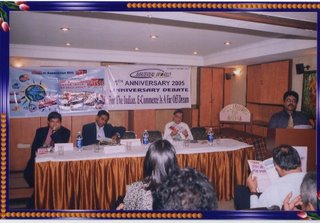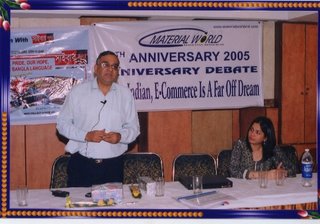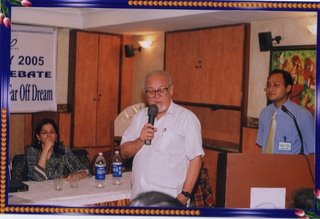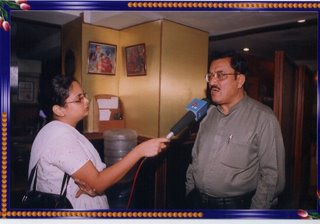Material World Knowledge
The blogspot shares the group's knowledge in the areas of human resource and supply chain management attained through years of experience of members of the team across verticals in India and overseas. The blogspot also shares knowledge generated at its events participated by celebrity experts from corporate, academicia, media, government and culture.
Monday, June 12, 2006
Sunday, June 11, 2006
Fringe Benefit Frills
RAJIB KUMAR
The dream team’s Fringe Benefit Tax at last gives me some opportunity to make the crossroads deadline…. I was thinking to write on the very fact that I was not able to write anything this time round; no kidding!
Webster defines fringe benefit as: “An employment benefit paid by an employer without affecting basic wage rates.”
Lot has been debated in the corporate circuit on the whim factor of Income Tax Officers toward assessment.
The following pointers shall be helpful for income tax officers and corporate CEOs alike:
Fringe Benefit Heads:
1. Car Parking (with THE STATE (THE STATE as in Webster “one of the constituents units of a nation having a federal government”) failing to make the grade on that count in metros like ours);
2. Dental insurance (independent and/or dependent of Chinese dentists on the oblivion course in Kolkata and/or Pvt players in the welfare state charging 10 L and more for BDS etc. etc.)
3. Mental insurance (need not be highlighted with high levels of depression and other psychotic disorders and the failure of THE STATE to provide civil amenities thereof for early or late intervention)
4. Coffee (No Kidding with espresso coffees charged at Rs. 20 upwards at the geometrically growing coffee shops)
5. Coffee Cups (Corollary/extension to previous, earthenware notwithstanding while on the railroad or elsewhere)
6. Floor Space (Marbled/Carpeted…comparative analysis on the executive’s floor space status at home; can be interpolated on weighted scale
based on mutually agreed parameters)
7. Furniture Benefits (higher tax for imported furniture)
8. Cash advance (same as with credit card usage except role reversal)
9. Undertime (if overtime can have direct financial implications undertime then surely)
10. Oxygen (as THE STATE fails to provide fresh non polluted air so consumers are definite fringed)
11. Water (as THE STATE fails to provide pure drinking water)
12. Heat (as THE STATE fails to check cold deaths in different parts of North India every year)
13. Hot Water (suggestion: price and decay period of heating element can be taken as the quantifying unit)
14. Internet Usage (can be assessed on same lines as thought in terms of telephone usage by the team; accrue on traffic from 5.30 pm onwards)
Further another front on the same subject can be considered to address the revenue hole as under:
Fringe Benefit Tax (Statutory) for non-employees/ associates/facilitators
Suggested heads:
1. Lunch & Refreshments for Income Tax Officers
2. Lunch & Refreshments for Sales Tax Officers (with reference to 1 (above), this sure will improve center-state relations)
Waivers:
Fringe Benefit Tax can however be waived for Punjabi Thalis, Idlis and Dosas and of course Pastas.
In Pursuit Of Veritable Leadership
GAUTAM CHATTERJEA
Up Close with the enigma called “Leader”
In the present times too many people attempt to project themselves as leaders yet, too few demonstrate unmistakable traits to be termed the true leader. Mimicry makes the biggest show in leadership race and the impressed following are covertly being piloted by magnanimous incompetence. Probably these are use of very harsh words, yet, I trust all those who have toiled to accomplish their ardour with vision and commitment will be happy to echo this state of affair.
Check it out around you. You will find many religious Big-Dads who impose on the public with huge followings and symbolic show of anchoring veneration, yet, hardly ever distinguish themselves with avid directions or guidance to deal with the numerous modern day problems his following face, and towards which they look forward for solace and solutions from him. Then, consider the political Neta. He is best known to be with you when it is sunny and disappear behind the umbrella in slightest drizzle. He has so far offered very little direction towards progress excepting of course preaching it. The reason for his failure is because he lacks commitment to what he preaches. Yet the public has been driven to believe that they are indisputable leader elements. Not true!
The corporate world in India too lacked the general sense of leading, till the economic reforms imposed compulsion of looking at leadership driven ventures. Unfortunately for too long in India, corporate managers practiced in a culture of centralized control. At a time in this information age when the pace of change dictates de-centralization for success, management structures to encourage new ideas are yet to develop as tools in the survival of the fittest. And with that the culture of leading or providing leadership largely remains undistinguished. Sooner or later we would better accept that the concept of collective corporate intelligence and its practice is, and will be the key to remain in the leader seat, which in turn will promote more of leader minds for organizations to benefit.
The universal element of leadership is central to distinction, success and accomplishment, nearly in every sphere of life. At war or peace, in winning and achieving, proof of distinct competence and astute thoughts of the spearheading mind is evident by results. Such value driven performance create benchmarks and invigorate superiority. And in pursuit for the better and the improved, the best gets the head start…piloted by leader calibres.
Footprints of a Leader
The accomplished leader finds acceptability and is venerated for many virtues that he exudes. Some of the more important ones that elevate a person to the leadership crest are the leader-worthy dynamism in a person.
The leader is a custodian. A leader has his primary task to provide ‘custodial leadership’. He is expected to espouse strength, character and discipline on his function. He is the preserver of aims, objectives and values of the task he initiates. He is the caretaker of the interest of the organization/community/team he is responsible for. He is able to create trust and faith on him and his ideas.
The custodial leader upholds what is best for all people and does not aim at privilege and power for self-acclaim. His popularity is generally for reasons of non-autocratic approaches. The quality of custodianship depends largely upon how we interpret our roles as a custodian, on how we think about other people, and on how we determine what is right and worth holding in trust.
The leader endows stewardship. Most of us in our lives take up a leadership role. Whether in our families, organization we work for, the businesses we run or in the administration or government. In these roles we induct in varying degrees direction, vision and guidance to empower others. We also assume a responsibility to maintain a set of standards that is in line with accepted principles.
Yet there should be no attempt to impose ourselves undesirably with our thoughts wants and desires on those who we lead. The dedicated leadership must not translate itself into dictatorship and must provide space for respecting the individual’s freedom, choices, responsibilities and accountability. This is the true aspect of ‘stewarding leadership’.
The leader is the person with foresight. The leader contravenes conformity and demonstrates excellent traits in clairvoyance, anticipation and adjustability.
He unequivocally demonstrates the ability to think ahead of others, is flexible and responsive with innovations. He is quick to address needs in change management and has resurgent qualities to silver-line his performance. He is always the forerunner on things to come.
The leader has progressive outlooks. Leaders accomplish success out of integrating core values in performance. He is a thinker and his thoughts travel beyond the conventional yet he dovetails the ideas into continuity. He is a revivalist and makes space for amends. He demonstrates and illustrates ways of doing things better, introduces productive qualities and inspires confidence of his group in them. He has accountability as his prime concern when empowering the endeavor.
The leader fosters initiatives. The leader has an eye for opportunities and possibilities. By his inventiveness he ushers in the new order, drafts progress and invigorates the potentials of the functions. He eliminates inertia and enables prospecting through perceptive concepts. His actions are driven by the urge to make matters better for the interest of the public and the people he leads.
He is a motivation for others and his initiatives make clear logic for others to emulate. Through his actions his primary aim is to induct excellence in the functions and tasks. And he plays his role to induce hope, aspiration and cheer.
The leader is a democrat. He always has a human face to offer. He empathizes with and considers the needs, feelings and aspirations of the employees and in the process makes intelligent decisions to advance a cause, a resolve and goodwill. These virtues allow him to be acceptable and dependable to his followers. He is also a socialist and shares ownership of success with both the team and the public. By his fraternal attitude he is able to carry others along.
Make a self-appraisal
In his management task the corporate executive has to develop multiple rungs of believer in him to be able to lead from the front. His activation plane is often quite complex. He has to coordinate and lead between internal and external human resources, inspire all round productivity and quality and bring himself to be seen as a partner in the endeavor. He can least afford to use his high position in corporate ladder as the ‘non-performing instructor’ if he has to sustain as the leader in a competitive scenario.
Douglas Mc Arthur a brilliant strategist and a farsighted administrator used a list of questions to guide him in his leadership performance. These elementary values can be used on most leadership situations.
Do I heckle my subordinates or strengthen and encourage them?
Do I use moral courage in getting rid of subordinates who have proven themselves beyond doubt to be unfit?
Have I done all in my power by encouragement, incentive and spur to salvage the weak and erring?
Do I know by NAME and CHARACTER a maximum number of subordinates for whom I am responsible? Do I know them intimately?
Am I thoroughly familiar with the technique, necessities, objectives and administration of my job?
Do I lose my temper at individuals?
Do I act in such a way as to make my subordinates WANT to follow me?
Do I delegate tasks that should be mine?
Do I arrogate everything to myself and delegate nothing?
Do I develop my subordinates by placing on each one as much responsibility as he can stand?
Am I interested in the personal welfare of each of my subordinates, as if he were a member of my family?
Have I the calmness of voice and manner to inspire confidence, or am I inclined to irascibility and excitability?
Am I a constant example to my subordinates in character, dress, deportment and courtesy?
Am I inclined to be nice to my superiors and mean to my subordinates?
Is my door open to my subordinates?
Do I think more of POSITION than JOB?
Do I correct a subordinate in front of others?
Source: The West Point Way of Leadership by Col. Larry R. Donnithorne
Profiles of Leadership
No person is born a leader. Neither could he be tailored into one. People who emerge as leaders make themselves so acknowledged because of their innate qualities, which are beyond the average. By their beliefs, visions, character and actions they convey some uniqueness about them that others find little difficulty in respecting and following. And people look upon such leader elements to guide them with directions.
There are three rudimentary elements which explain why some, not many among us become leaders.
Ø Some natural personality traits in a person could give a person the edge in launching him into leadership roles. This is the element of traits.
Ø Some pressing situation or an event could propel a person to rise to the occasion and, in addressing a solution he demonstrates qualities that appeal to others by their merits. This is the element of response.
Ø Some who aim to be leaders learn to lead by practice and equip themselves with skills and attitudes to find acceptance in their chosen roles. This is the element of endowing.
Yet to inspire people into teamwork there are certain things a leader must be [beliefs and character], know [task and skills to do it] and do [implement, motivate, direct and provide]. And these do not come naturally, unless there is an honest effort in acquiring them continually through work and study. A person qualifies as an experienced leader only when he has mastered the techniques of leading with depth of knowledge and candor.
Material World Anniversary Debate Series # 2 - A Report
The second in the series was held on 31st August 2005 at Flavors of India restaurant at Kolkata, India. This motion was: For the Indian, E Commerce is a Far Off Dream.
Delivering the welcome address, Rajib Kumar, CEO of the Material World Group summarized some of the plans of the group for the future. In particular, he expressed the management’s intentions to conduct knowledge events more frequently in future.
Setting the motion for deliberation, Kumar stressed that the advent of Electronic Commerce has indeed enabled organizations and customers to shop and order virtually anything online. However if the full promise of e-commerce is to be realized, the goods must reach the buyer just as quickly.
The growth of e-commerce, he said, has to be seen in proper perspective and in appreciation of the realities in India:
A survey finding puts the % of roads available for speedy transportation at a nightmarish 2%.
1.7% of the road network carries 40% of all road traffic; 25% of highway network suffers from congestion
What is the future of e-commerce in India then? He invited the distinguished panelists to throw light on this.
The Chief Guest Prof (Dr.) Sujit Basu Vice Chancellor, Vishwa Bharati University stressed the continual endeavor of Vishwa Bharati to conduct online courses. The Vice Chancellor felt that mindset and technology problems are the major bottlenecks in the process of implementing E Commerce. He shed his own experience as to how technology problems encountered in Bolpur,
Shantiniketan, the internationally revered seat of Tagore learning, had to wait for intervention of experts from Kolkata. Is e-governance a reality in India? Prof Basu wondered.
Dr. Abhijit Sen, Past President of Bengal Chamber of Commerce & Industry and an engineer from MIT asked the gathering to take note that 300 million Indians still cannot write their names. While projects like ITC’s e-chaupal were a step in a right direction, he added, still lots need to done. B 2 B, Dr. Sen opined, was doing fine but B 2 C is still for the “haves” –those who have access to telephone lines, internet and credit cards.
D K Chaudhuri, CEO, Skytech Solutions responding to the concerns of Dr. Sen & Prof Basu stressed on the alternate devices of accessing the net like TV and mobile phones. Low PC penetration, therefore, he felt, should not come in the way of reaping the benefits of e-commerce.
Khokan Mookerji, Secretary General, Bengal Chamber of Commerce & Industry was in his usual forthright self and felt that for the “have-nots” e commerce is indeed is a far off dream. The former executive of ITC said that e-chaupal is strong statement of intent. He praised the government, especially the state government for taking significant strides toward development of IT.
Dr. G D Gautama, Principal IT Secretary, Government of West Bengal, speaking against the motion wondered if India is a recognized information technology power in the world how exactly could e commerce be a distant dream? Recognizing that there is indeed a “mindset” barrier toward successful implementation of e commerce Dr Gautama emphatically declared, “I am an optimist”. With PCs available for just 10,000 the benefits of IT shall pervade all walks of society he added.
Preeti Desai, the President of the Internet & Online Association of India was armed with statistics in her laptop. Online Advertising in India was in the order of 107 Crores 2004-05 and shall be 137 Crores 2005-06, she told the gathering. Married men are buying toys and jewelery on net, she added. Well, so are unmarried men, she was quick to add. Desai said that that share wise 63% of the products sold were travel. Kolkata ranked 3 in online Music sales and 4 for Movies she revealed.
Preeti’s stats did the trick it seemed: The motion was defeated by the house.
The Pailan Group and Cyberjug co sponsored the event.
Saturday, June 10, 2006
Material World Anniversary Debate Series # 3, August 31, 2006
For India Inc, Corporate Social Responsibility is Just another Jargon
Corporate social responsibility (CSR) is an expression used to describe what some see as a company’s obligation to be sensitive to the needs of all of the stakeholders- in its business operations -and that includes subsidiaries and affiliates, partners, local neighborhood, investors and shareholders.
CSR is closely linked with the principles of "Sustainable Development" in proposing that enterprises should be obliged to make descisions based not only on the financial factors but also on the social and environmental consequences of their activities.
CSR policies should ideally be built on transparency, stakeholder dialogue, and integrity in the conduct of business.
Today’s heightened interest in the proper role of businesses in society has been promoted by increased sensitivity to environmental and ethical issues. Issues like environmental damage, improper treatment of workers, and faulty production leading to customers inconvenience or danger, are highlighted in the media. In many advanced nations government regulations regarding environmental and social issues have become stringent in recent years. Again, some investors and investment fund managers have begun to take account of a corporation’s CSR policy in making investment decisions. Further, some consumers have become increasingly sensitive to the CSR performance of the companies from which they buy their goods and services. These trends have contributed to the pressure on companies to operate in an economically, socially and environmentally sustainable way. But is India Inc doing enough?
Internationally, many corporate houses now bring out annual reports describing how they fared on the environmental and social responsibilities front. McDonald, as an example, participates in the National Spring Clean Campaign and in 1989 they set up the Ronald McDonald Children’s Charities. Among other things, this charity funds around 200 “Ronald McDonald Houses”, which provide free accommodation to the families of children in hospital. There other companies as well like BP, Body Shop, which report annually on environmental and social initiatives.
It is easy to imagine the improved standards our social environment could flourish in, when corporations overwhelmingly decide to step forward with investments in shouldering obligations on social investment more eagerly. Not that this ancient land is being exposed to the concept of corporate social responsibility for the first time. Or, the concept itself is a phenomenon being borrowed from the west ever since globalization has taken on the fast track. Ancient Indian history has innumerable instances of businessmen and traders taking up community benefit projects all on their own, to ensure that the community gets a share of the monetary gains businesses make, in the form of better life. Even Chanakya the economist, had advocated reinvestment of wealth in the community for social progress. So where and when did we Indians misplace our conscientious identity? Is it attitudinal indifference or is it simply the ignorance and nonchalance syndrome.
Indian entrepreneurs have the best of corporate minds and stand shoulder to shoulder with the finest breed in the world. They are the living legends. They are not just industrialists but they are also men with a mission – to do good to society. But are they doing enough on this?
Industrial safety, supporting local development and combating poverty, AIDS and environmental stewardship are some of the critical challenges that India Inc face today.
CSR is a relatively new term to have found increasing international legitimacy as today’s way of doing business. In developing countries, this term is widely used by the corporate to convince the people that things have changed and that a new ethical global business practice is underway. However, the ground realities show that industry’s idea of ethical business has not changed much from the days of Union Carbide disaster of 1984. In March 2000, a leading MNC’s high profile India operations was found to have dumped over 300 MT of mercury outside its plant at Kodaikanal in South India (Source toxicslink.org)
On the other hand companies like Canon India says in its website that it understands its Social Responsibility as a good Corporate Citizen and endeavors to make meaningful contributions to the society in several areas like Humanitarian Aid and Disaster Relief, Social Welfare and Conservation of Environment
CSR, if applied in its true sense, can be an opportunity of bringing a level of accountability into the business.
(With Inputs from Gautam Chatterjea, Ex- O & M, Image & Communication Mentor)


Material World is a prominent resource center in the area of management science and information technology in Eastern India. The group’s activities targeted at greater industrial benefit hence service to community have received recognition from various quarters across the industrial spectrum.
MW instituted the Material World Anniversary Management/Tech Debate Series in 2004. The theme of the 1st in the series was “Good Managers Need Not Be B School Graduates” and the second was “For the Indian-Commerce Is A Far Off Dream”.
Please visit also:
www.materialworldind.com/events.asp
http://materialworldind.blogspot.com
August 31, 2004 – Topic “Good Managers Need Not Be B School Graduates”
Chief Guest: Mr. Dipak Rudra, Fmrly, Transport Secretary, Govt of West Bengal
Speakers: Dr. G D Gautama, Principal IT Secretary, Govt of WB, Mr. D P Patra, Jt. MD, MCC PTA Corp Pvt Ltd, Mr. Santanu Bhattacharya, Executive Director (Materials), CESC Ltd etc.
August 31, 2005 – Topic “ For the Indian, E-Commerce Is A Far Off Dream”
Chief Guest: Prof (Dr.) Sujit Basu, Vice Chancellor, Vishwa Bharati University
Speakers: Ms. Preeti Desai, President, Internet & Mobile Association of India, Dr. G D Gautama, Principal IT Secretary, Govt of WB, Mr. Khokan Mookerji, Secretary General, Bengal Chambers of Commerce & Industry, D K Chaudhuri, CEO, Skytech Solutions, Dr. Abhijit Sen, Past President, Bengal Chambers etc.
The Motion for Material World Anniversary Debate Series # 3 :
For India Inc, Corporate Social Social Responsibility is Just another Jargon



